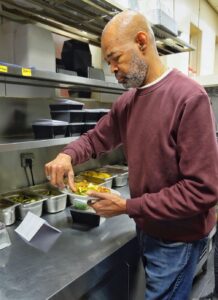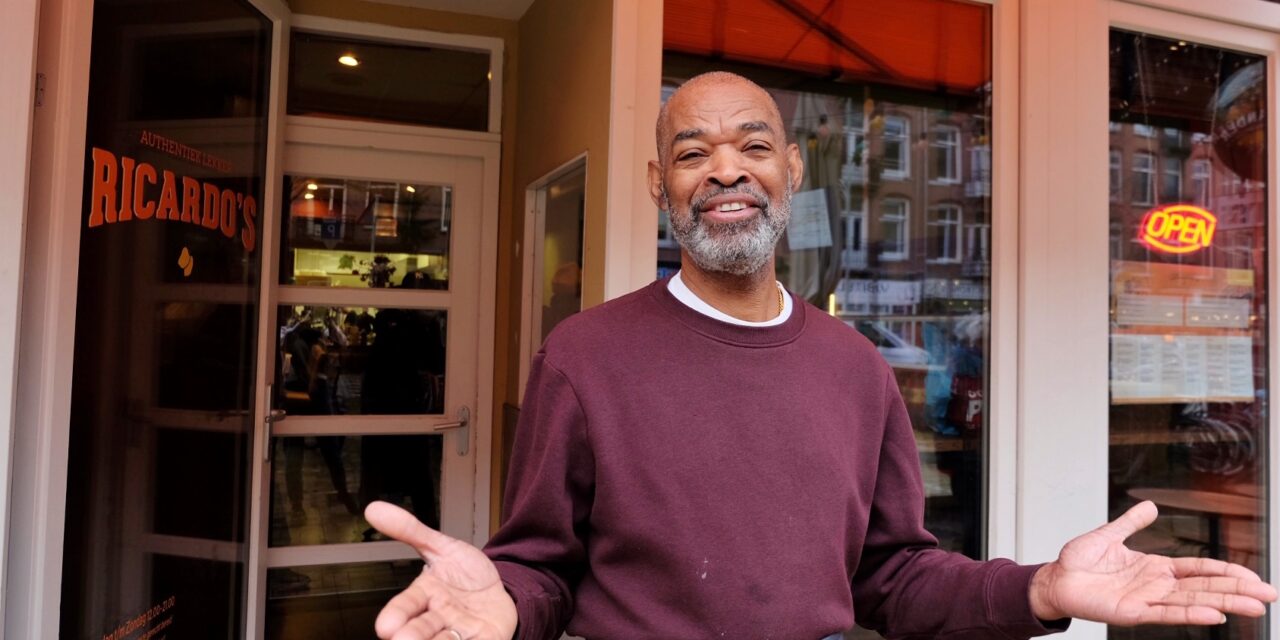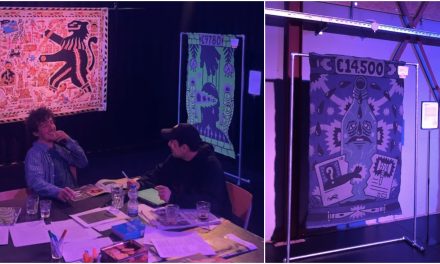A cook torn between tradition and keeping pace with new developments. Ricardo – a slim and tall man with a bald head but greyish beard – made a name for himself in Amsterdams surinamese food scene. Immigrating from Surinam in the 80s, he brought his experience in cooking to the Netherlands, now serving traditional dishes to his customers in his own eatery „Ricardo‘s“ since 2006.
The chef has lots of experience cooking surinamese food. „I was always the cook. Even in Suriname during the time I went to school all my friends came to me and then we sat and I just cooked something for us. It’s one thing I did my whole life. I didn’t do nothing else, only cooking.“
It doesn’t seem that he has lost passion for his cultural heritage in any way since then, expressing it through his work. The restaurant owner stresses that the food will only be authentic if you show full commitment. „If you and I, we are cooking at the same time, there would always be a difference. Because I put my soul inside. I do it with love, and you can find that in the taste. If someone put’s love in the food while cooking, you always taste that.“
While doing so, Ricardos main concern is to keep his kitchen true to surinamese tradititon.

Ricardo serving the traditional surinamese dish „moksi alesi“.
„If you dont do it in a proper way, you are going to loose this authenticity. Because authenticity means: just like my grandmother.“ The love for surinamese food is deeply rooted in him, even so far that he doesn’t really enjoy any other cuisine quite as much. Preparing his dishes the traditional way not only connects him with his origin, it is also a way to commemorate the colonial past of Suriname, keeping the awareness awake through food.
It should be clear by now what a big roll surinamese cuisine plays in Ricardos life, and how crucial he finds the tradition behind it. Can someone that takes such pride in the roots of his traditional profession manage when external influences potentially drive its culture in new directions?
For cooks, this is currently the case. As more and more people are changing their diets with the goal of a more eco-consious and ethical lifestyle, the expectations on the culinary industry change. Vegetarian alternatives slowly but surely become the norm, not only in supermarkets but in restaurants, too. It seems that this development can be esspecially challenging for traditional cuisine, as Ricardo explains. „ We dont exactly have vegetarian food in Suriname because this is something from the last years. If people come here and ask me: ‚do you have something vegetarian?‘ The only thing I can offer them is rice with tomato sauce and vegetable; greens.“ He explains that the recognition of vegetarian diets is still really uncommon in Suriname. In his experience, not eating different kinds of meat has only been known if people have allergies, but the meat would usually be substituted with another kind of meat. „If you have a allergy they will not cook it for you. So they are looking to alternatives for making food for you. But maybe if you can not eat chicken, you are going to eat fish.“ Vegetarian dishes are really unusual and in that sense also untraditional for surinamese cuisine.
And even though this clashes with Ricardos value to stay as close to the traditional way of food preparation as possible, he is open to react to the for him new trend with the wishes of his costumers in mind. „I have to look further for the future what we can serve for them, so I have homework to do. We have to look what we are going to do with it because I want to please everyone. Different nationalities, but also different dietary preferences.“




